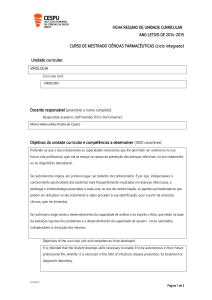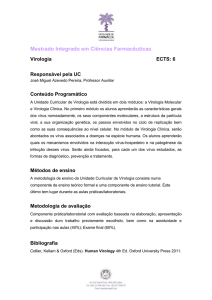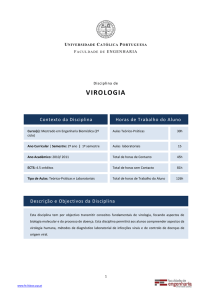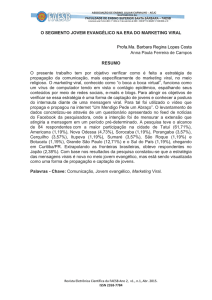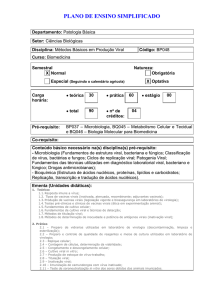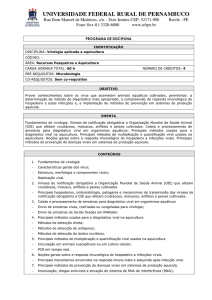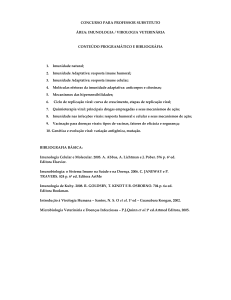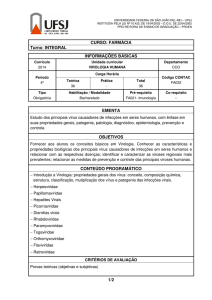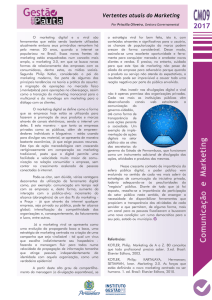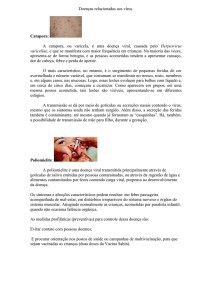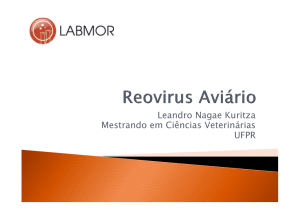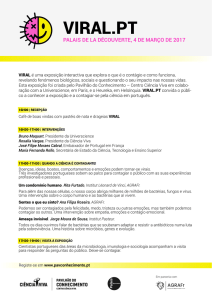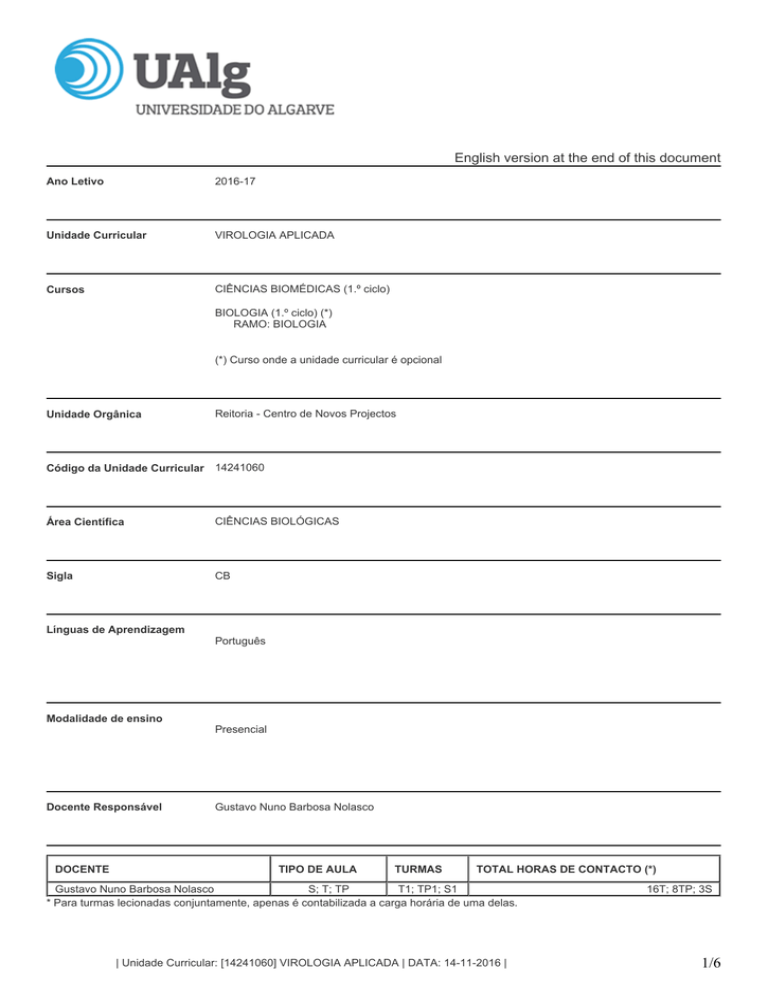
English version at the end of this document
Ano Letivo
2016-17
Unidade Curricular
VIROLOGIA APLICADA
Cursos
CIÊNCIAS BIOMÉDICAS (1.º ciclo)
BIOLOGIA (1.º ciclo) (*)
RAMO: BIOLOGIA
(*) Curso onde a unidade curricular é opcional
Unidade Orgânica
Reitoria - Centro de Novos Projectos
Código da Unidade Curricular 14241060
Área Científica
CIÊNCIAS BIOLÓGICAS
Sigla
CB
Línguas de Aprendizagem
Português
Modalidade de ensino
Presencial
Docente Responsável
DOCENTE
Gustavo Nuno Barbosa Nolasco
TIPO DE AULA
TURMAS
TOTAL HORAS DE CONTACTO (*)
Gustavo Nuno Barbosa Nolasco
S; T; TP
T1; TP1; S1
* Para turmas lecionadas conjuntamente, apenas é contabilizada a carga horária de uma delas.
| Unidade Curricular: [14241060] VIROLOGIA APLICADA | DATA: 14-11-2016 |
16T; 8TP; 3S
1/6
ANO
PERÍODO DE FUNCIONAMENTO*
HORAS DE CONTACTO
HORAS TOTAIS DE TRABALHO
ECTS
3º
S2
16T; 8TP; 3S
84
3
* A-Anual;S-Semestral;Q-Quadrimestral;T-Trimestral
Precedências
Sem precedências
Conhecimentos Prévios recomendados
Molecular Biology, Microbiology
Objetivos de aprendizagem (conhecimentos, aptidões e competências)
Conhecimento do ciclo infecioso ao nível celular das famílias de vírus empregues no desenvolvimento de vectores virais
para terapia génica. Modificações do tipo selvagem necessárias para a construção de cada tipo de vector. Objectivos e
problemas e associados a cada tipo. Riscos de manuseamento e níveis de segurança.
Outras aplicações dos vírus na indústria farmacêutica.
Conteúdos programáticos
Estrutura das partículas virais. Tipos de genoma e estratégia de expressão. Classificação de Baltimore
Ciclo geral de infecção ao nível celular.
Mecanismos de defesa celular autónomos e não autónomos. Estratégias de evasão viral.
Ciclo infecioso e mecanismo de transformação celular mediada por vírus de DNA de cadeia dupla de genoma pequeno e médio
(Polyiomaviridae, Papilomaviridae e Adenoviriade). Vectores virais baseados em Adenovírus.
Ciclo infecioso de vírus de DNA de genoma grande (Herpespiridae, Poxviridae, Baculoviridae). Vectores virais derivados.
Ciclo infecioso de Parvoviridae. Vectores virais baseados em parvovírus autónomos e vírus adenoassociados
Ciclo infecioso e mecanismos de transformação mediados por Retroviridae. Vectores virais baseados em retrovírus e
lentivírus.
Comparação das aplicações e usos dos vários tipos de vectores.
Outras aplicações de vírus na indústria farmacêutica.
Métodos usados no estudo de vírus. Métodos de quantificação e diagnóstico. Diagnóstico molecular
| Unidade Curricular: [14241060] VIROLOGIA APLICADA | DATA: 14-11-2016 |
2/6
Metodologias de ensino (avaliação incluída)
As aulas teóricas e teórico-práticas decorrem com utilização do método expositivo e em sala de aula equipada com projetor de slides.
Nas aulas teórico-práticas faz-se a aplicação dos conhecimentos analisando e discutindo artigos científicos ou questões postas pelo
docente antecipadamente.
A avaliação é feita por um teste ou por exame final (dispensa com 10 no teste). Em ambos os casos a matéria avaliada versa sobre as
aulas teóricas, teórico-práticas
Bibliografia principal
Carter, J & Saunders, V. 2007. Virology. Principles and applications. John Wiley & sons Ltd. 383 pp.
Advanced bibliography:
Flint, S.J. et. All., 2009. Principles of Virology, 3rd edition. 2 vols. ASM press. 1034 pp
Viral vectors for gene therapy. 2011. Methods and protocols. O-W Merten and M. Al-Rubeai eds. Humana press. 450 pp
| Unidade Curricular: [14241060] VIROLOGIA APLICADA | DATA: 14-11-2016 |
3/6
Academic Year
2016-17
Course unit
APPLIED VIROLOGY
Courses
BIOMEDICAL SCIENCES (1st Cycle)
BIOLOGY (1st Cycle) (*)
OPTION: BIOLOGY
(*) Optional course unit for this course
Faculty / School
Reitoria - Centro de Novos Projectos
Main Scientific Area
CY BI
Acronym
BC GB
Language of instruction
Portuguese
Learning modality
Presencial
Coordinating teacher
Gustavo Nuno Barbosa Nolasco
Teaching staff
Gustavo Nuno Barbosa Nolasco
* For classes taught jointly, it is only accounted the workload of one.
Type
S; T; TP
Classes
T1; TP1; S1
| Unidade Curricular: [14241060] VIROLOGIA APLICADA | DATA: 14-11-2016 |
Hours (*)
16T; 8TP; 3S
4/6
Contact hours
T
16
TP
PL
TC
S
E
OT
O
Total
8
0
0
3
0
0
0
84
T - Theoretical; TP - Theoretical and practical ; PL - Practical and laboratorial; TC - Field Work; S - Seminar; E - Training; OT - Tutorial; O - Other
Pre-requisites
no pre-requisites
Prior knowledge and skills
Molecular Biology, Microbiology
The students intended learning outcomes (knowledge, skills and competences)
Understanding the cellular infectious cycle of the virus families used in the development of viral vectors for gene therapy.
From wild type to viral vector: major modifications. Major modifications to construct viral vectors. Aims and concerns
regarding each kind of vector. Risks and biosafety containment levels.
Other uses of viruses in pharmaceutical industry.
Syllabus
Virion structure. Types of viral genomes and expression stratgies. Baltimore classification.
Virus infectious cycle at the celular level.
Autonomous and non-autonomous cell defence mechanisms. Viral evasion of celular defence mechanisms.
Infectious cycle and cellular transformation mechanism mediated by ds-DNA viruses with short and medium-sized
genomes (Polyiomaviridae, Papilomaviridae e Adenoviriade). Adenovirus based vectors.
Infectious cycle of ds-DNA virus with large genomes (Herpesviridae, Poxviridae and Baculoviridae) and derived viral
vectors.
Infectious cycle of Parvoviridae. Viral vectors based in autonomous parvovirus and Dependovirus.
Infectious cycle and sellular transformation mechanisms mediated by Retroviridae. Viral vectors based in retrovírus and
lentivirus.
Aims of use of each kind of vector. Risks and biosafety containment levels.
Other uses of viruses in pharmaceutical industry
| Unidade Curricular: [14241060] VIROLOGIA APLICADA | DATA: 14-11-2016 |
5/6
Teaching methodologies (including evaluation)
The theoretical and theoretical ? practical lessons will use the expository method, using the debate to promote reflection and active
participation of students. The class room will be equipped with a powerpoint projector. In part of the theoretical ? practical lessons the
students will apply their knowledge to solve questions posed in advance by the teacher . Other theoretical ? practical lessons are used to
analyse and discuss relevant papers.
Student evaluation is done through one test during the semester or a final examination. In both cases the matters under evaluation
comprise all the subjects of the theoretical, theoretical ?practical and practical classes.
Main Bibliography
Carter, J & Saunders, V. 2007. Virology. Principles and applications. John Wiley & sons Ltd. 383 pp.
Advanced bibliography:
Flint, S.J. et. All., 2009. Principles of Virology, 3rd edition. 2 vols. ASM press. 1034 pp
Viral vectors for gene therapy. 2011. Methods and protocols. O-W Merten and M. Al-Rubeai eds. Humana press. 450 pp
| Unidade Curricular: [14241060] VIROLOGIA APLICADA | DATA: 14-11-2016 |
6/6

